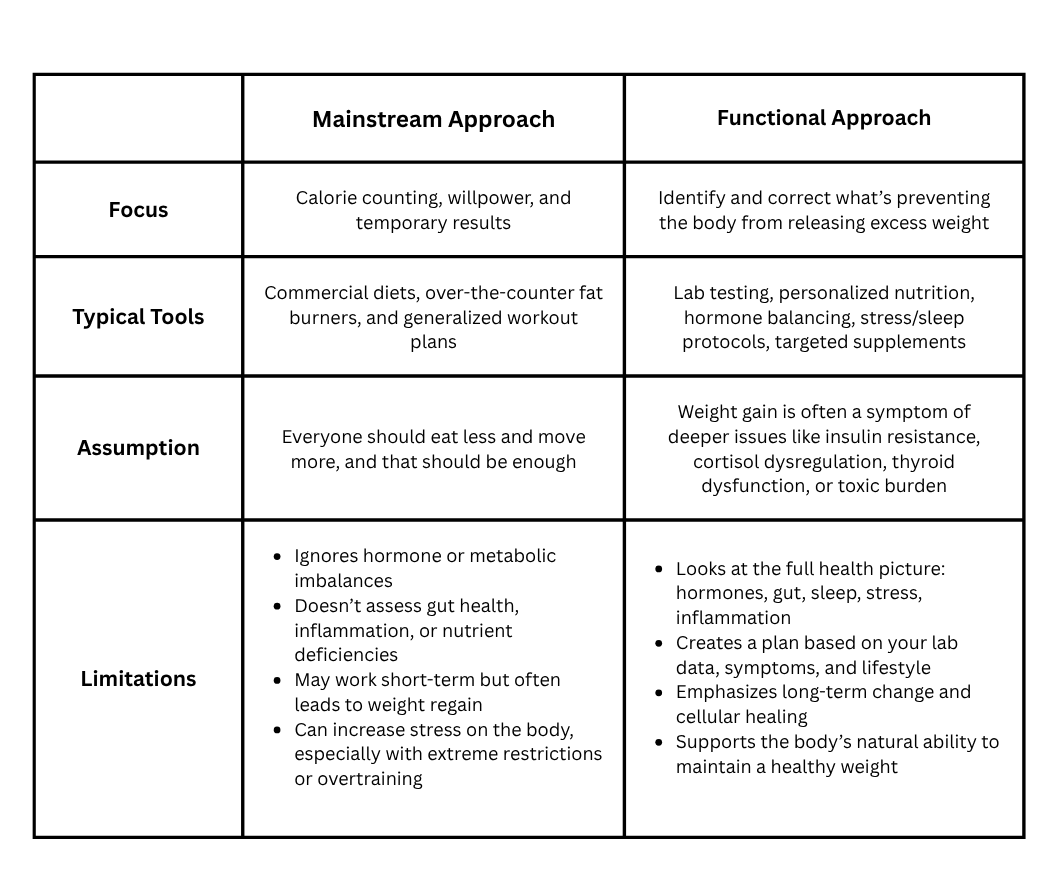Successful weight loss is not just about eating less or exercising more; it’s more about understanding why your body is holding onto weight in the first place.
Research indicates that addressing behavioral, metabolic, and psychological factors improves long-term outcomes. That’s why we create personalized weight loss plans that prioritize hormone optimization, nutrient-dense eating, and lifestyle alignment.
To help you move beyond temporary fixes and into lasting change, we’ve outlined six clinically grounded strategies that support sustainable weight loss through a personalized, root-cause approach.
Why Identifying the Root Cause Matters in Weight Loss Therapy
Weight gain is often viewed as a simple issue of eating too much and moving too little. However, the functional medicine perspective acknowledges that weight is regulated by a complex network of systems, including metabolic, hormonal, psychological, and even environmental factors. These interconnected systems determine how the body stores fat, responds to food, manages stress, and maintains energy balance.
The Centers for Disease Control and Prevention (CDC) emphasizes that effective weight loss requires long-term lifestyle changes, including adopting healthy eating habits, engaging in regular physical activity, and making behavioral modifications. However, without identifying what’s disrupting these areas, these lifestyle efforts often fall short or produce only temporary results.
When the root cause is identified through comprehensive evaluation and testing, treatment can be personalized. This enables precise interventions that go beyond general recommendations, helping individuals lose weight in a manner that is also sustainable.
Functional weight loss therapy doesn’t aim to suppress symptoms; instead, it focuses on addressing the underlying causes. It works by uncovering what’s driving the body out of balance and correcting it at the source.
6 Weight Loss Strategies That Guarantee Success
Losing weight works best when you combine proven science with a plan that fits your needs. Here are six practical strategies, based on clinical insights, to help you achieve real, lasting results.
1. Identify the Underlying Cause of Weight Gain
Before developing any treatment plan, the first priority is to uncover what’s disrupting the body’s ability to maintain a healthy weight. This may include hormonal imbalances such as elevated cortisol levels, insulin resistance, estrogen dominance, low thyroid function (hypothyroidism), or low testosterone levels. Other causes may include gut dysbiosis, chronic inflammation, micronutrient deficiencies, poor mitochondrial function, or sleep disruption.
At Asymmetric Health, we conduct advanced diagnostic testing, including hormone panels, metabolic assessments, inflammation markers, and GI testing, to pinpoint the biological systems contributing to weight retention. Once identified, these imbalances become targets for correction, allowing the body to respond more efficiently to nutrition, movement, and lifestyle changes.
2. Create a Personalized Weight Loss Plan
A personalized weight loss plan is structured around your unique biological, behavioral, and lifestyle profile. It moves away from generic calorie-cutting advice and focuses on matching your nutrition, movement, and recovery strategies to how your body actually functions.
To create a tailored plan, you first need to identify key factors that influence your weight, such as:
- Hormone levels (like cortisol, insulin, estrogen, thyroid)
- Blood sugar regulation and energy crashes
- Nutrient deficiencies
- Digestive or gut health issues
- Inflammation and immune reactivity
- Sleep quality and stress load
- Activity level and time availability
From there, your weight loss plan can be customized with specific, evidence-based strategies such as:
- A low-glycemic, high-protein diet for someone with insulin resistance
- Meal timing or intermittent fasting for those with sluggish metabolism or appetite dysregulation
- Stress reduction techniques (like breathwork or nervous system regulation) if cortisol is elevated
- Detoxification and liver support if estrogen dominance is detected
- Movement routines tailored to your energy level—e.g., walking, strength training, or yoga
- Supplement protocols for common deficiencies (such as magnesium, vitamin D, and omega-3s)
Tracking progress is also part of the plan, which includes monitoring body composition, energy levels, digestive response to food, sleep quality, and even mood changes. The more responsive your plan is to real feedback, the more sustainable and successful your results will be.
3. Combine Nutrition with Sustainable Eating Habits
A successful plan doesn’t rely solely on calorie restriction; rather, it emphasizes nutrient-dense, whole-food choices that regulate blood sugar, reduce inflammation, and support hormone balance.
Key dietary principles include:
- Prioritizing high-quality proteins (e.g., grass-fed meats, wild-caught fish, pasture-raised eggs) to support muscle preservation and satiety.
- Including healthy fats such as avocado, olive oil, nuts, and omega-3s to stabilize hormones.
- Choosing complex carbohydrates from vegetables, legumes, and low-glycemic fruits to prevent insulin spikes.
- Eliminating refined sugars, artificial sweeteners, seed oils, and ultra-processed foods that disrupt metabolism.
Equally important is building sustainable habits, including consistent meal timing, mindful eating, balanced macronutrients at each meal, and effective hydration practices. Nutrition becomes a supportive system when it’s tied to the body’s real needs.
4. Incorporate Activity that Matches Your Lifestyle
Exercise should be customized to your current energy levels and musculoskeletal health. Intense or prolonged exercise can backfire if the body is under stress or experiencing adrenal fatigue, thyroid dysfunction, or elevated cortisol.
A more effective approach is to align physical activity with what your body can recover from and benefit from the most. For example:
- Individuals with high cortisol levels may benefit from low-impact movements, such as walking, yoga, or brief resistance training, to help reduce overstimulation.
- Individuals with insulin resistance may respond well to strength training and short-duration, high-intensity interval training (HIIT), which can help enhance muscle sensitivity to glucose.
- Sedentary individuals can start with a 15-minute daily walk after meals to help regulate blood sugar and digestion.
5. Address Sleep, Stress, and Hormonal Balance
Chronic stress, poor sleep, and disrupted hormone signaling are three of the most overlooked causes of weight gain, and often the reason weight loss stalls despite diet and exercise.
Sleep affects everything from appetite-regulating hormones (like ghrelin and leptin) to insulin sensitivity and nighttime fat metabolism. Inadequate sleep (less than 7 hours per night) has been clinically linked to increased abdominal fat storage and reduced metabolic function.
Stress elevates cortisol, which can lead to increased cravings, blood sugar instability, abdominal fat storage, and inflammation. Women experiencing estrogen dominance may struggle with water retention, breast tenderness, and fat accumulation in the hips and thighs. At the same time, low testosterone in men can lead to reduced muscle mass and fat gain.
6. Use Supplements Wisely (When Needed)
While supplements are not a shortcut to weight loss, they can significantly support metabolic function when chosen correctly and used in the right context. Many over-the-counter “weight loss supplements” are poorly formulated or stimulatory, offering little long-term benefit and often triggering negative side effects.
Instead, we focus on evidence-based nutraceuticals that support cellular and hormonal function, such as:
- Berberine: improves insulin sensitivity and mimics some effects of metformin.
- Inositol: supports blood sugar regulation, particularly in patients with PCOS.
- Green tea extract (EGCG): promotes fat oxidation and thermogenesis.
- Soluble fiber (e.g., glucomannan): increases satiety and improves gut health.
- Magnesium and B vitamins: support stress response and energy metabolism.
For patients with low protein intake or increased protein needs, functional weight loss drinks (e.g., high-quality protein shakes with added fiber or adaptogens) can replace nutritionally poor meals and help stabilize blood sugar levels.
Supplementation is only recommended when supported by lab data or clinical need, and always as part of a broader, root-cause treatment plan.
What Are the Best Weight Loss Options Today?
The most effective weight loss options today are not based on trendy diets or generic fitness programs; they’re built on personalized, root-cause strategies that correct biological imbalances and support long-term metabolic health.
To better understand what makes certain approaches more successful than others, let’s compare mainstream and functional models of weight loss:

Conclusion: Weight Loss Success Starts with Strategy and Self-Awareness
Weight loss is not a willpower problem; it’s a systems problem.
When the body holds onto excess weight, it often signals that something deeper is out of balance. Whether it’s disrupted hormones, chronic stress, sleep deprivation, or poor cellular function, the key to long-term success lies in identifying and correcting those underlying issues.
Real change doesn’t come from extreme dieting or high-intensity workouts; it comes from understanding your body’s unique needs and creating a strategy that supports healing at the root level.
Self-awareness is what transforms weight loss from a short-term effort into a sustainable lifestyle shift.
Start Your Personalized Weight Loss Plan with Asymmetric Health
At Asymmetric Health, we help you stop guessing and start healing.
Our member-based approach goes far beyond traditional weight loss methods. We utilize advanced laboratory testing, hormone and metabolic evaluations, and individualized protocols to create a plan tailored to your unique biology.
We’ll help you uncover what’s really going on and what to do about it.
Book your consultation today to get started with a personalized, root-cause weight loss program that actually works.
Your body has the ability to change. You just need the right plan and the right partner.
